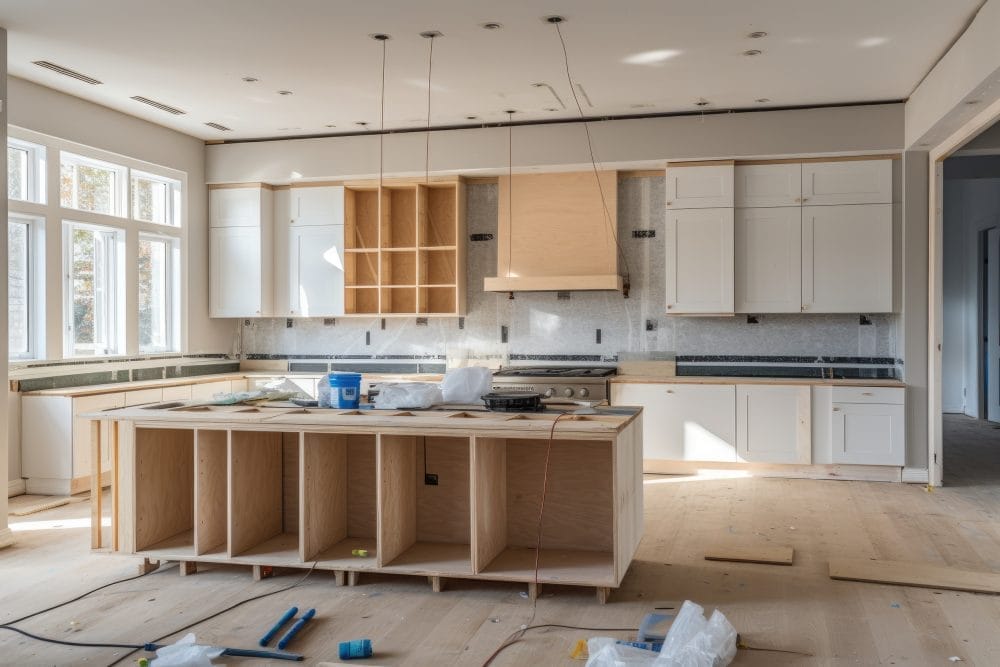Renovations are exciting until a knock on the door from the city inspector puts everything on pause. What feels like a harmless “weekend upgrade” can turn into a bureaucratic maze faster than you can say building code.
The truth is, not every project needs a permit, but plenty of popular ones do, and skipping the paperwork can cost a fortune later. From fines to forced tear-downs, the consequences sting a lot more than the filing fee. The trick is knowing which updates raise red flags before a project even starts swinging hammers.
1. Kitchen Remodels With Plumbing Tweaks
A fresh countertop swap? Usually, no problem. But move the sink, reroute a drain, or extend water lines, and suddenly the project crosses into permit territory. Cities are picky about plumbing because water leaks and poor connections can cause mold, flooding, and structural damage. Skipping the proper sign-off could mean tearing out that gorgeous new backsplash just to expose the pipes underneath. It’s the hidden parts of a remodel, not the shiny finishes, that make inspectors lean in closer.
2. Basement Finishing Projects
Transforming a dark basement into a cozy living space feels like a dream upgrade. But finishing walls, adding electrical outlets, or setting up a bathroom drags permits into the conversation. Basement renovations often involve fire safety codes, egress window requirements, and proper ventilation checks. Without approval, homeowners risk having a space labeled “uninhabitable,” no matter how stylish the new flooring looks. Permits aren’t just paperwork here—they’re a stamp of safety assurance.
3. Backyard Deck Additions
Adding a deck seems straightforward, but structural stability makes it one of the most tightly regulated outdoor projects. Decks have to handle heavy loads, harsh weather, and safe railing systems, and inspectors don’t take shortcuts lightly. Building without a permit can lead to forced demolition if the structure doesn’t pass safety checks. That’s especially frustrating after investing in lumber, labor, and landscaping. A deck is meant for barbecues and sunsets, not battles with the permit office.
4. Electrical Upgrades and Rewiring
Swapping a light fixture? Fine. Running new wires, upgrading the panel, or installing outlets in new places? That’s permit territory every single time. Electrical codes protect against fires, shocks, and overloaded systems that can turn dangerous quickly. Unpermitted wiring can void insurance claims if damage occurs, leaving homeowners with massive bills. Inspectors want proof that the work was handled safely, not patched together under the radar.
5. Bathroom Overhauls
Bathrooms look simple, but under the surface, they’re a tangled web of plumbing, ventilation, and electrical connections. Adding a shower, moving the toilet, or installing new wiring all demand permits. Building departments focus heavily on moisture management because leaks behind walls can cause lasting damage. Ventilation fans are also checked for proper ducting to avoid mold and air quality problems. A sparkling new bathroom can quickly sour if it’s flagged as unapproved work during a sale or inspection.
6. Garage Conversions
Turning a garage into a home office or guest suite is a popular trend, but it’s one of the most permit-sensitive updates out there. Conversions often involve plumbing for bathrooms, insulation upgrades, electrical circuits, and heating or cooling systems. Cities worry about structural changes and fire separation rules between the living space and the garage. Without a permit, the converted area might never be considered legal square footage. That means no return on investment when it’s time to sell.
7. Fence Installations and Height Changes
A new fence seems harmless until a neighbor complains or the city measures its height. Many municipalities cap fence heights and require permits for tall structures, especially in front yards. Building without approval can result in orders to lower or remove sections of fencing. Property lines can also create disputes that become headaches without the right documentation. A simple fence can cause surprisingly big trouble when the paperwork gets skipped.
Keep Projects Smooth and Legal
Home improvements should add value, not stress, and avoiding permit trouble is part of making that happen. The reality is, permits aren’t just red tape—they’re checks that keep upgrades safe, durable, and recognized as official. While some projects sail under the radar, many of the most exciting updates sit squarely in permit territory. Getting the green light upfront is far easier than fighting to undo mistakes later.
Have thoughts on tricky renovation projects or a permit story to share? Drop a comment and join the conversation.
Read More
8 Renovations That Will Make Your House Harder to Sell
How to Budget for Your Home Renovation Effectively








